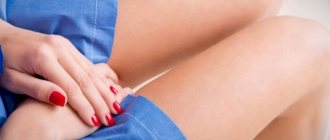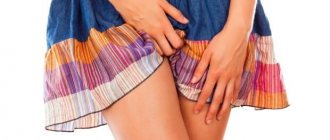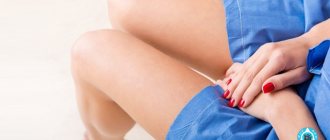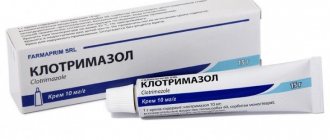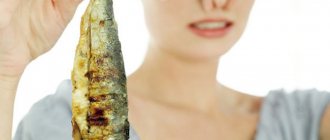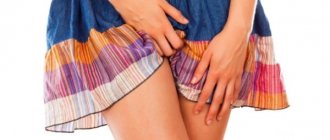Can menopause cause itching?
Low estrogen levels can cause itchy skin
During menopause, a woman's estrogen levels begin to decline.
Estrogen is important for maintaining healthy skin. This hormone helps keep your skin hydrated by stimulating the production of natural oils and collagen. Collagen is a protein that provides strength and elasticity to the skin.
Decreased production of natural oils and collagen can lead to dry, thinning skin. Such changes are often accompanied by itching.
When a symptom is pathological
The sign can be not only physiological, but also pathological. Most often, itching is accompanied by diabetes mellitus. In this case, there is an increased level of glucose. Pathology leads to impaired blood supply to organs and tissues. The mucous membranes become irritated.
Itching is present during inflammatory processes. The symptom is the result of contact of the mucous membranes with urine.
Itching can also be the result of an allergic reaction. A variety of detergents and personal hygiene items act as provocateurs. The symptom will continue to bother you until its root cause is ruled out.
Soaps and shower gels can cause itching
Candidiasis leads to itching. The pathology is caused by the presence of a certain fungus. A woman complains of curdled discharge and an increased urge to urinate. The clinical picture will become more pronounced at night. The treatment is quick and does not cause discomfort. You need to visit a doctor who will select appropriate therapeutic methods for eliminating thrush.
With herpes, a woman complains of itching and burning. Swelling and severe redness occur.
Types of itching during menopause
Women may experience different types of itching during menopause.
Itchy skin
Because skin becomes less hydrated and less elastic during menopause, women may become more sensitive to cosmetic products such as soaps or laundry detergents. High sensitivity is manifested by skin irritation, which leads to inflammation and itching.
Some women experience itching along with tingling or numbness of the skin. This condition in the medical world is usually called paresthesia.
Sometimes women during menopause experience a rare type of paresthesia, which is characterized by a crawling sensation.
The intensity of the itching can vary from mild to severe. In more severe cases, itching can cause sleep disturbances and interfere with daily life activities.
Itching is often accompanied by other skin problems, which may include the following:
- dry skin;
- skin rash;
- skin redness;
- small bumps on the surface of the skin.
If visible skin irritation occurs, a woman should go to the hospital so that a doctor can diagnose her and rule out serious medical conditions, such as bacterial or fungal infections.
Genital itching
Decreased estrogen levels may result in new or worsening vaginal problems.
During menopause, women may experience more itching in the genital area. They will suffer more from this problem if they have vaginal dryness, another common symptom of menopause.
Low estrogen levels cause vaginal tissue to become drier and thinner. This condition is commonly called vaginal atrophy or atrophic vaginitis. It causes itching and pain in the vagina or vulva. Atrophic vaginitis is often accompanied by pain during sex.
Vaginal itching can also be caused by the following factors:
- irritation from soaps and washing powders;
- inflammation;
- vaginal cancer, vulvar cancer and, in rare cases, cervical cancer.
After menopause, the body is more susceptible to developing certain forms of cancer, so women should urgently consult a doctor if they experience bleeding or vaginal discharge during this period.
General recommendations for lifestyle changes
Menopause leaves its mark on a woman’s entire lifestyle. You need to learn to regulate your behavior and habits in order to feel good and not provoke itching and discomfort. Doctors give the following recommendations for a healthy lifestyle:
- proper nutrition . To eliminate allergic manifestations and discomfort, you need to exclude or limit spicy, salty and fatty foods, which can change the composition of urine and cause discomfort;
- rest more , spend time in the fresh air more often so that the body recovers strength faster;
- maintain a stable weight and do not overeat . Fat deposits can provoke inflammatory skin diseases and various fungi, including in the intimate area.
Of course, these methods alone will not relieve burning in the intimate area in women during menopause, but they can minimize allergic sensations and unpleasant symptoms.
Home treatment methods
Moisturizing prevents dry skin and itching
Women can often effectively treat or prevent itchy skin through gentle skin care and by making diet and lifestyle changes.
Below are steps you can take to relieve itchy skin during menopause.
Using cold compresses
Cold, wet compresses on itchy areas of the skin can help soothe the irritation. Covering the affected areas of the body with a damp towel at night can help relieve sleep problems, which are often caused by severe itching.
Taking oatmeal baths
Bathing in water with colloidal oatmeal helps relieve itchy skin.
Colloidal oatmeal is oatmeal that has been ground to a powder. By soaking this powder in water, your skin will easily absorb the cellulose and fiber found in oatmeal. By using colloidal oatmeal you can soften your skin and soothe itching.
The powder should be diluted in a warm bath and the water should not be too hot, as this may aggravate the itching.
Regular moisturizing
Moisturizing after a bath or shower helps retain moisture in the outer layers of the skin. This eliminates dryness and itching.
Local remedies
If a woman does not have any provoking diseases, diseases of the reproductive system such as thrush, herpes, then she can limit herself to special suppositories, gels and ointments that relieve unpleasant symptoms. Among the popular drugs are Ovestin, Estriol, Ortho-Ginest and others. Women often choose gels Ovestin, Klimara, Divigel and others, as well as ointments Vaginal, Montavit, Ginecomfort . After menopause, during sexual intercourse, gynecologists recommend using special lubricants and lubricants to avoid discomfort and injury. However, remember that all of the above remedies only alleviate unpleasant symptoms, but are not able to eliminate them completely.
Drug treatment
Sometimes itching recurs despite home therapy. In such situations, treatment with over-the-counter or prescription medications may be necessary.
Steroid creams
The modern market offers light steroid creams that can be purchased with or without a doctor’s prescription. These products contain at least one percent hydrocortisone, which soothes itchy and inflamed skin when applied to the affected area.
Steroid creams are only suitable for short-term use. Using these products for more than a week may cause side effects such as blistering or redness.
Anesthetic creams
Topical anesthetic creams, such as benzocaine, numb the skin and thus provide temporary relief from itching. They also should not be used for a long time or applied to damaged skin, as this may worsen irritation.
Antihistamines
Although the main purpose of antihistamines is to treat allergies, many women also use them when trying to relieve itching during menopause. Antihistamines can be taken in tablet form or applied to the skin as ointments.
Hormone replacement therapy
Hormone replacement therapy (HRT) is used to restore hormonal levels in menopausal women. This type of treatment helps relieve symptoms of menopause, such as hot flashes, vaginal dryness, and loss of bone density.
Although HRT is not usually prescribed specifically to treat itching, by increasing estrogen levels, skin problems can be eliminated or alleviated.
It is important to understand that HRT carries certain risks, so if a woman wants to try this treatment method, she will first need to discuss this issue with her doctor.
Phytoestrogens
Phytoestrogens are natural substances found in some plants. They differ in their properties from estrogens produced in the body, but provide similar effects.
World science has recently begun to study the benefits of phytoestrogens in the treatment of menopausal symptoms, but it has already managed to find out something. Thus, in 2014, American scientists conducted a study, the results of which showed that phytoestrogens can replace HRT in terms of their beneficial properties, although they have minor or no side effects.
Prevention of itching during menopause
Staying hydrated will help prevent itching
Women can reduce the likelihood of itchy skin during menopause by following these guidelines.
- Avoid baths and showers with hot water , which can strip the skin of its protective layer of natural oils. For people who have sensitive skin, it is better to wash with slightly warm water.
- Gently pat your skin after washing. Rough rubbing of the towel against irritated and itchy skin can aggravate existing problems. Therefore, it is necessary to choose a towel made of soft material and gently absorb moisture into it.
- Don't scratch your skin. Itchy skin often makes you want to scratch it with your nails, but this can damage the affected areas, especially if they are already inflamed. Instead of scratching your skin, apply cold compresses to relieve itching. Wear gloves at night to avoid accidentally scratching your skin while sleeping.
- Use cosmetic products without fragrances. Scented soaps and perfumes contain harsh chemicals that can irritate the skin. To protect yourself from this effect, use soaps and body washes that are fragrance-free and designed for dry and sensitive skin.
- Limit your alcohol and nicotine consumption. These substances dry out the skin and contribute to its premature aging.
- Wear soft and breathable fabrics. Cotton clothing is much less likely to cause skin irritation compared to wool or synthetic fabrics, which can also stick to the body.
- Avoid exposure to strong sunlight. Harmful UV rays can irritate dry, itchy or tender skin. Use sunscreens that are designed for sensitive skin.
- Stay hydrated. Water is essential for maintaining healthy skin and preventing itching.
